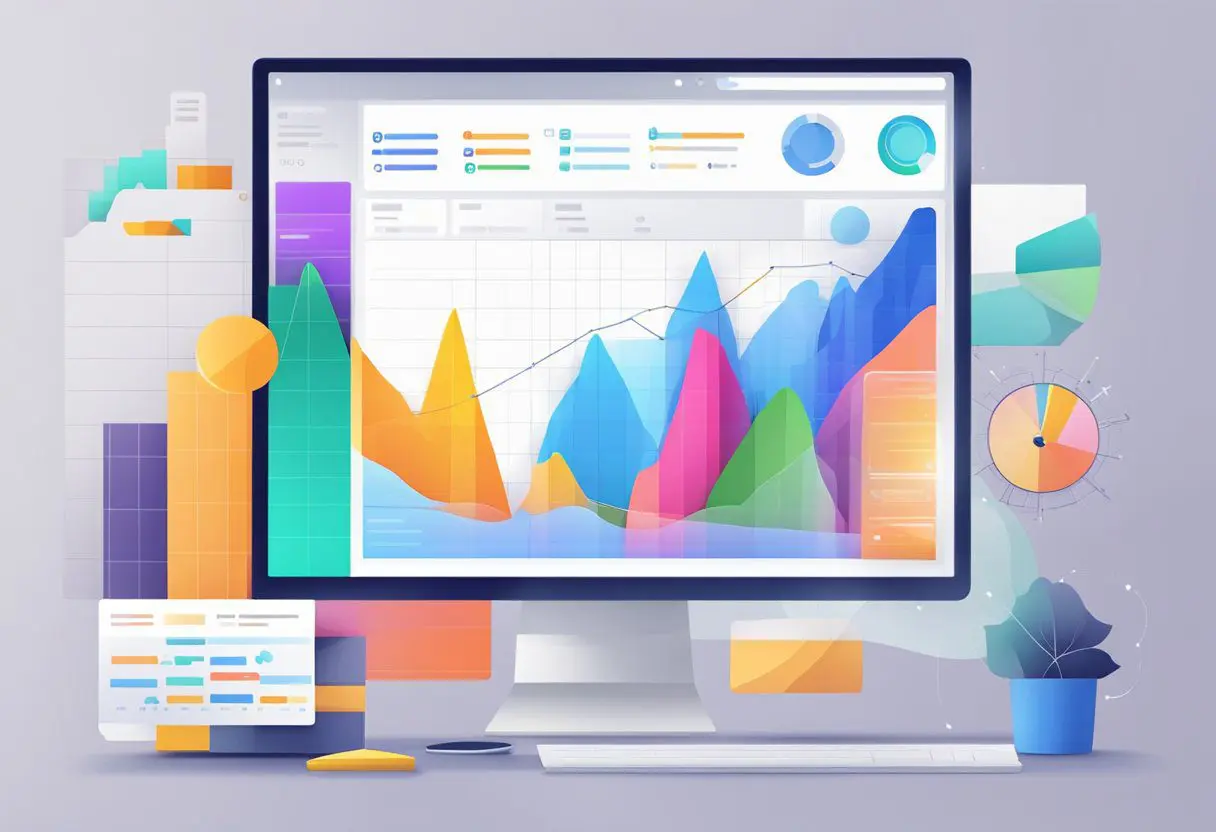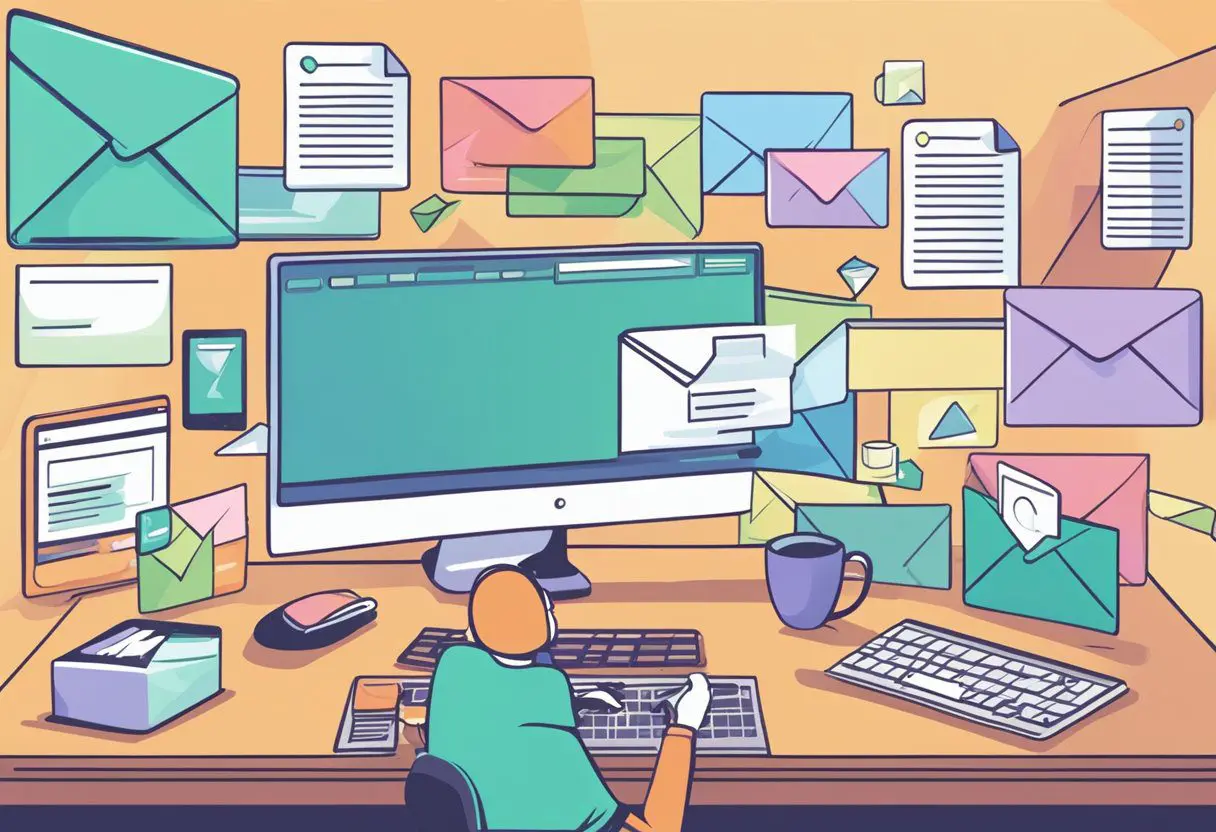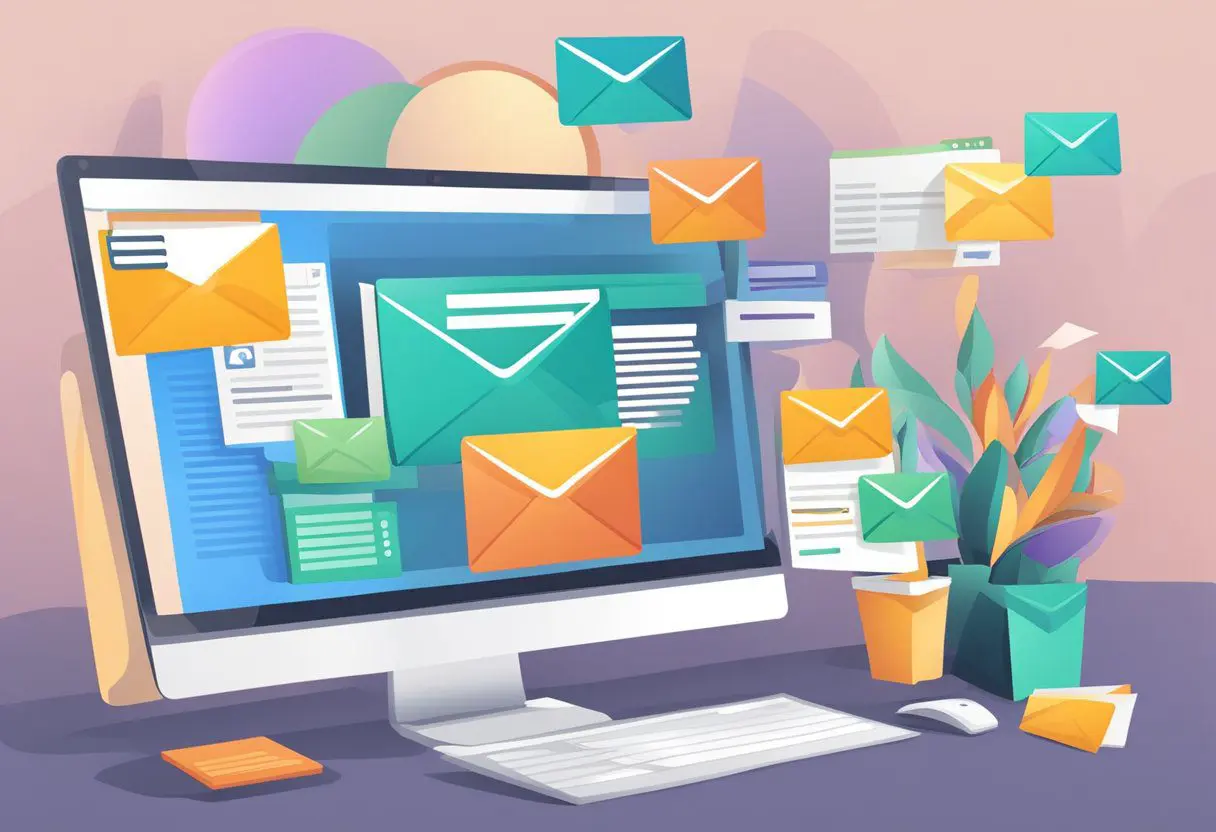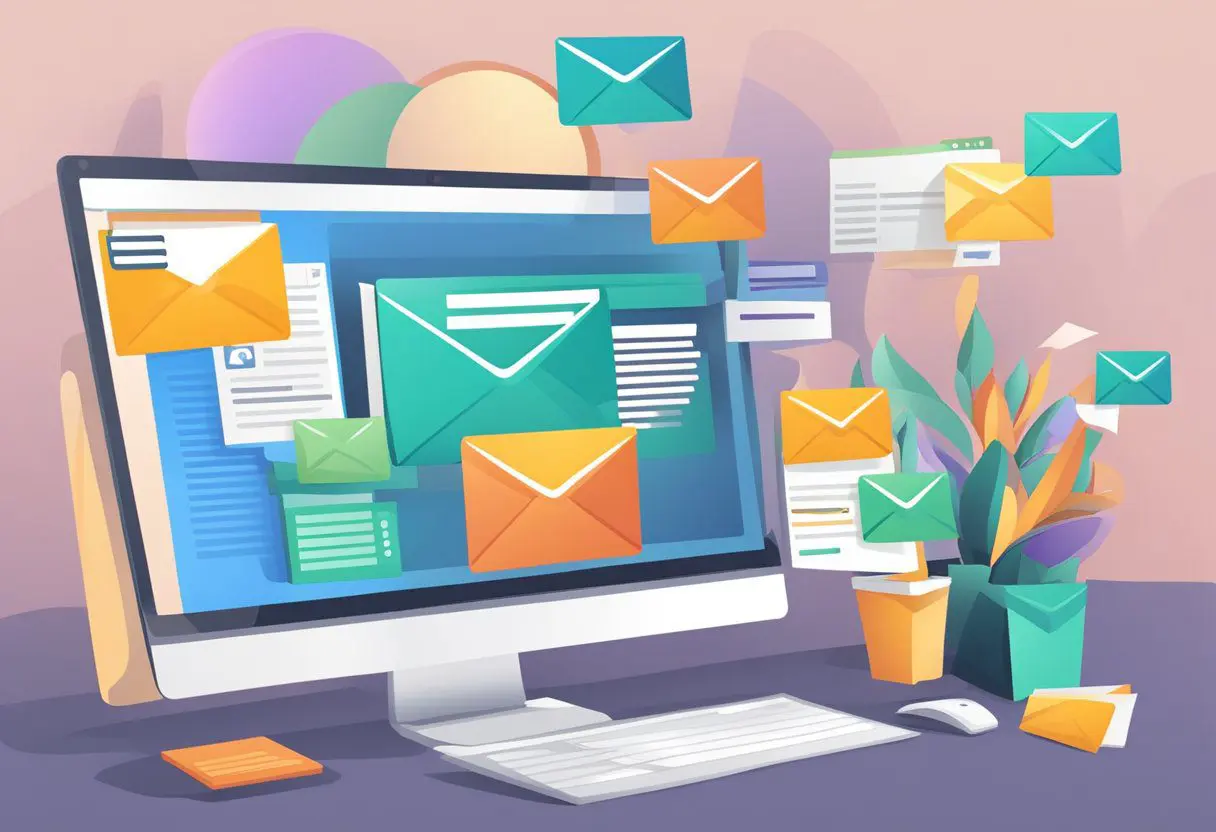Table of Contents
Email marketing software is a potent tool for businesses seeking to connect with their audience in a personalised way while achieving tangible results. This type of software allows companies to craft, send, and track emails with ease, automating much of the process and providing critical insights into customer behaviour. From small start-ups to large corporations, email marketing solutions facilitate targeted communication strategies that can result in increased customer engagement and revenue.

Selecting the right email marketing platform can be pivotal for a successful marketing campaign. These platforms offer varying features such as customisable templates, email automation, and detailed analytics to measure the success of each campaign. They help marketers understand which messages resonate with their audience, the best time to send emails, and how to optimise their content for improved performance. With the support of AI-powered tools, marketers are now better equipped to personalise campaigns and predict customer behaviours, advancing the effectiveness of their email strategies.
For businesses that require a UK mailing address or global mail forwarding services to bolster their communication efforts, specialised mailing services provide an additional layer of operational support. These facilities ensure that customer communications, whether digital or physical, are handled efficiently, reflecting the business’s dedication to its clientele. By integrating email marketing tools with broader communication strategies, businesses are more capable than ever of cultivating strong customer relationships and fostering growth.
Choosing the Right Email Marketing Software

When selecting email marketing software, businesses face a multitude of options, each with its own set of features and pricing models. It’s important to discern the differences to identify which platform aligns most closely with an organisation’s marketing objectives.
Understanding Different Types of Email Marketing Software
Free Solutions: Ideal for small businesses and startups, free email marketing software such as Mailchimp’s basic plan or Moosend’s free tier generally provides core tools for sending emails, but with limitations on the number of subscribers and emails that can be sent.
Premium Plans: As businesses grow, they often require advanced features such as segmentation, A/B testing, and integrations with other systems, all typically available with premium options. Constant Contact is an example of this type of service.
Standard Offerings: Most email marketing platforms provide standard features across free and premium plans, including templates, reporting, and basic list management, which can serve as a starting point for most businesses to begin their email marketing efforts.
Key Features to Look For
When considering an email marketing solution, look for these essential features:
- User-Friendliness: Intuitive interfaces that save time.
- List Management: Robust tools for managing subscriber lists are critical for segmentation and personalisation.
- Automation: Look for capabilities like autoresponders and triggered emails which enhance engagements without extra work.
- Analytics: Insightful reporting informs strategy and shows the ROI of campaigns.
- Deliverability: High deliverability rates ensure emails reach the inbox.
- Integrations: Being able to connect to other software can streamline workflows and centralise data.
Building and Managing Your Email List

A cornerstone of any effective email marketing strategy is creating and meticulously managing an email list. This foundational asset enables one to segment their audience for targeted communication and integrate operations with a Customer Relationship Management (CRM) system like Zoho Campaigns.
Importance of Segmentation
Segmentation plays a pivotal role in customising communication. By breaking down one’s email list into specific groups based on criteria such as demographics, purchasing behaviour, or engagement level, businesses can send targeted emails that are more likely to resonate with the recipient. This tailored approach increases the relevance of the content, thereby enhancing the chance of conversion.
Effective Contact Management
At the heart of a well-maintained email list is contact management. Efficiently organizing contacts avoids clutter and ensures the right messages reach the right people. Integration with a CRM system facilitates the syncing of subscriber information across platforms, leading to improved campaign effectiveness and customer insights. Businesses should leverage tools, such as HubSpot, to unify their email marketing activities with their broader marketing initiatives.
Creating Compelling Email Campaigns

The success of an email marketing strategy heavily relies on the execution of email campaigns that stand out in the recipient’s inbox. Crafting these requires attention to detail in both design and content.
Designing Impactful Email Templates
The design of an email template is the first thing a recipient notices. A visually appealing layout is critical for engagement. To construct an impactful template, one must use a clean structure with a balance of images and text. Templates should be responsive, ensuring they are readable on any device. Companies can utilise top email marketing platforms which often provide a variety of predesigned templates. These templates can serve both promotional emails and transactional emails, tailored to the message. For newsletters, consistent branding with the company’s logo, colours, and typography distinguishes and reinforces brand identity.
Personalizing Your Message
Personalization goes beyond simply inserting a recipient’s name in the email. It involves crafting content that resonates on a personal level. This means segmenting audiences and tailoring messages based on their preferences, behaviours, and previous interactions. By leveraging tools from platforms like Mailchimp, marketers can automate personalization at scale. A well-targeted subject line can significantly increase open rates, while content that addresses the recipient’s needs and interests boosts engagement. For promotions, including an exclusive offer or recommendation based on past purchases can make the email feel bespoke. Personalized emails cultivate a sense of relationship between the brand and the customer, which can lead to improved loyalty and conversion rates.
Enhancing Campaigns with Automation and Testing
Effective email marketing often hinges on the strategic use of automation and rigorous A/B testing. These pivotal elements work in concert to enhance the efficiency and efficacy of campaigns.
Leveraging Automation for Efficiency
Automation in email marketing allows for the timely execution of campaigns without the need for constant manual intervention. Platforms like ActiveCampaign offer sophisticated automations that enable marketers to send triggered emails based on specific user actions or behavioural data. This can range from welcoming new subscribers with an introductory email series to retargeting emails based on past purchase behaviour. Automated drip campaigns keep the audience engaged, nurturing leads by delivering a sequence of messages at predetermined intervals.
A/B Testing for Better Results
A/B testing, or split testing, is a method used to compare different versions of an email to determine which one performs better. By changing one variable at a time, such as subject line, email content, or call to action, marketers can ascertain which variation resonates more with recipients. Tools within automations platforms support this form of testing by allowing tests to run concurrently with ongoing campaigns, thereby not disrupting the overall marketing strategy. For instance, an email marketing software may utilise A/B testing to refine subject lines, leading to improved open rates and, consequently, higher conversion rates.
Advanced Analytics and Reporting
Analytics play a pivotal role in measuring the effectiveness of email marketing campaigns. Insightful reporting tools enable marketers to track key metrics such as open rates, click-through rates, and conversions. By assessing these analytics, businesses can determine the ROI of their email efforts and understand how recipients interact with their content. Tools like Litmus provide comprehensive metrics to test assumptions, optimise subject lines and content, as well as to ensure deliverability.
Additionally, engagement data reveals how effectively a campaign maintains the interest of the target audience and prompts them to take action. Revenue tracking connects the final dots by attributing sales to specific emails, which is vital for substantiating the extended impact of the campaign on a business’s bottom line.
Key metrics to focus on include:
- Email open rate: The percentage of recipients who open the email.
- Click-through rate: The frequency at which recipients click links within the email.
- Conversion rate: The ratio of recipients who complete a desired action after opening the email.
Iterative Improvements and Strategies
Email marketing is not about one-off campaigns; rather, it thrives on iterative improvements. Using optimisation tools such as A/B testing platforms, businesses can experiment with different subject lines, email designs, and call-to-action buttons to refine their approach continuously.
Understanding the customer journey is vital for effective optimisation. Each email should be seen as a step in a larger process that guides the recipient towards the end goal — be it making a purchase, signing up for a webinar, or another conversion metric.
Strategies for optimisation might include:
- Segmentation: Dividing the audience into groups based on behaviour or demographics to increase relevance.
- Personalisation: Leveraging data to tailor the email content to the individual.
- Timing: Scheduling emails to arrive when recipients are most likely to engage.
Integrations and Expansion to Multichannel Marketing
In the modern digital arena, email marketing software with robust integrations serves as the backbone to a dynamic multichannel marketing strategy. Businesses leverage these integrations to connect with e-commerce platforms, social media, and much more, paving the way for comprehensive, all-in-one marketing solutions.
Essential Integrations for Email Marketing
For an email marketing campaign to be effective, it must integrate seamlessly with other business tools. E-commerce platforms are often at the top of this list, as they allow for direct communication with customers based on purchase history and browsing habits. A fully integrated business suite can pull in data from customer relationship management (CRM) systems, enhancing personalisation and targeting accuracy. When considering email marketing software, one should look for:
- CRM Integration: Enabling a synchronised flow of customer data.
- Analytics Tools: Providing insights into campaign performance.
- Advanced automation features, like triggered emails based on user behaviour.
These integrations can significantly boost the efficiency of marketing campaigns, fostering richer customer experiences and driving sales.
Expanding Beyond Email
While email is a powerful tool, true engagement often requires reaching audiences across multiple channels. Therefore, email marketing software must offer social media integration, ensuring consistent messaging across platforms and the ability to track cross-channel engagement. An all-in-one marketing platform may also provide functionalities like:
- Direct posting and scheduling to social media networks.
- Coordinated campaigns across email, social media, and mobile messaging.
- Unified reporting for clear insights into multi-channel performance.
Frequently Asked Questions
Choosing the right email marketing software can significantly impact the effectiveness of a company’s marketing campaigns. This section addresses common queries that may arise during the selection and use of email marketing tools.
Which factors should one consider when choosing email marketing software?
When selecting email marketing software, businesses should consider deliverability rates, user interface friendliness, automation capabilities, and scalability. It’s imperative to evaluate whether the software accommodates the size of their email lists and the complexity of their marketing strategies.
How does email marketing software integrate with CRM systems?
Email marketing software typically integrates with CRM systems to provide a seamless flow of customer data between platforms. This integration allows for more personalised marketing efforts and a unified view of customer interactions.
What are the key differences between free and paid email marketing platforms?
Free email marketing platforms often have basic features, suitable for smaller campaigns and limited audiences. In contrast, paid platforms generally offer advanced automation, integration options, in-depth analytics, and customer support, essential for larger-scale operations.
Which email marketing software features are essential for small businesses?
For small businesses, essential features of email marketing software include easy-to-use email builders, basic automation tools, and insightful analytics to track campaign performance. Additionally, integration with other tools they are already using can be highly beneficial.
How do GDPR regulations affect the use of email marketing software in the UK?
GDPR regulations affect UK email marketing software use by necessitating strict consent requirements for email lists and providing individuals with the right to access or delete their data. Software must facilitate compliance with these regulations, ensuring data protection and privacy.
What are the advantages of using specialist email marketing software for e-commerce?
E-commerce-centric email marketing software offers benefits such as personalised product recommendations, abandoned cart reminders, and post-purchase follow-ups. These features help in driving sales and building long-term customer relationships.